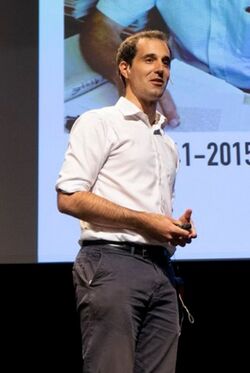Biography:Bernhard Mistlberger
Bernhard Mistlberger | |
|---|---|
 | |
| Born | 1987 (age 36–37) |
| Nationality | Austrian |
| Known for | Pioneering multi-loop Higgs Boson calculations |
| Awards | Henry Primakoff Award for Early-Career Particle Physics (2022)
|
| Scientific career | |
| Fields | |
| Institutions | MIT Center for Theoretical Physics
|
| Doctoral advisor | Babis Anastasiou |
Bernhard Mistlberger (born 1987) is an Austrian theoretical particle physicist known for his significant work in the area of quantum field theory. He is known for multi-loop calculations in quantum chromodynamics (QCD), including the first high-precision theoretical predictions of Higgs and vector boson production at the Large Hadron Collider.[1]
Career
Since 2020, Mistlberger has been a faculty member in the SLAC Theory Group at Stanford University.[2] He was previously a Pappalardo Fellow in the Center for Theoretical Physics at MIT, and a research fellow at CERN.[3][4]
In 2020, he was awarded the Wu-Ki Tung Award for Early-Career Research on QCD, for "pioneering theoretical computations of multi-loop radiative contributions for precision Higgs and electroweak physics at hadron colliders".[5][6]
In 2021, he was awarded the European Physical Society’s Gribov Medal, for "groundbreaking contributions to multi-loop computations in QCD and to high-precision predictions of Higgs and vector boson production at hadron colliders".[7][8]
In 2022, he won the American Physical Society's Henry Primakoff Award for Early-Career Particle Physics, for "groundbreaking contributions to high-precision quantum field theory, including the next-to-next-to-next-to-leading order QCD corrections to the production of Higgs and electroweak vector bosons at hadron colliders."[9] In the same year, he also won the Guido Altarelli Award for "advancing the frontier of perturbative calculations in QCD to N3LO".[10]
References
- ↑ "Bernhard Mistlberger". https://scholar.google.com/citations?user=MBNjPIUAAAAJ&hl=de.
- ↑ "People". 2016-02-29. https://theory.slac.stanford.edu/about-us/people.
- ↑ "Pappalardo Fellowships in Physics » MIT Physics" (in en-US). https://physics.mit.edu/research/pappalardo-fellowships-in-physics/.
- ↑ "Bernhard Mistlberger's author profile in INSPIRE". https://inspirehep.net/authors/1259311.
- ↑ "Tung Award". https://varelas.people.uic.edu/tung_award/.
- ↑ "European Physical Society announces 2021 awards" (in en-GB). 2021-06-01. https://cerncourier.com/a/european-physical-society-announces-2021-awards/.
- ↑ "SLAC physicist honored for precision particle theory research" (in en). https://www6.slac.stanford.edu/news/2021-06-16-slac-physicist-honored-precision-particle-theory-research.aspx.
- ↑ "European Physical Society announces 2021 awards" (in en-GB). 2021-06-01. https://cerncourier.com/a/european-physical-society-announces-2021-awards/.
- ↑ "Prize Recipient" (in en). http://www.aps.org/programs/honors/prizes/prizerecipient.cfm.
- ↑ "DIS2022: XXIX International Workshop on Deep-Inelastic Scattering and Related Subjects". https://indico.cern.ch/event/1072533/timetable/#20220506.
External links
- "Bernhard Mistlberger (SLAC)". https://inspirehep.net/authors/1259311.
- "Bernhard Mistlberger's Profile | Stanford Profiles". https://profiles.stanford.edu/bernhard-mistlberger.
 |

